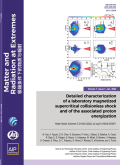首页|期刊导航|Matter and Radiation at Extremes|Ab initio density response and local field factor of warm dense hydrogen
Matter and Radiation at Extremes2024,Vol.9Issue(5):P.48-67,20.DOI:10.1063/5.0211407
Ab initio density response and local field factor of warm dense hydrogen
摘要
关键词
local/incomplete/rigorous分类
数理科学引用本文复制引用
Tobias Dornheim,Sebastian Schwalbe,Panagiotis Tolias,Maximilian P.Böhme,Zhandos A.Moldabekov,Jan Vorberger..Ab initio density response and local field factor of warm dense hydrogen[J].Matter and Radiation at Extremes,2024,9(5):P.48-67,20.基金项目
supported by the Center for Advanced Systems Understanding(CASUS),financed by Germany’s Federal Ministry of Education and Research(BMBF)and the Saxon State Government out of the State Budget approved by the Saxon State Parliament (CASUS)
funding from the European Research Council(ERC)under the European Union’s Horizon 2022 Research and Innovation Program(Grant Agreement No.101076233,“PREXTREME”). (ERC)

